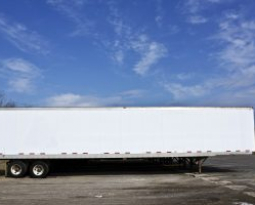
A PERFECT STORM
It’s become a cliché. When events seem to conspire to produce bad results, we call it a “perfect storm.” If you’re an owner-operator in 2022 you can probably relate. Rising inflation, fuel prices that no one can remember seeing, logistical nightmares, chip shortages and delays caused by not enough warehouse workers, mechanics, etc., etc. What next? A plague of locusts? During the pandemic there was more freight than trucks to haul it and truckers entered the business in large numbers. Why make money for X, Y, Z Inc. if you can make it for yourself? Diesel was almost cheap compared to today. Freight rates could be bid up on the spot market. If you had patience and knew what you were doing, you could make a decent profit while covering your costs.
As if setting the stage for a bubble to burst, this happy time went on for two years. However, storm clouds were gathering on the horizon. Lower demand for diesel during the worst of the pandemic had led to reduced production. At the same time, a few refineries were down for maintenance or accidents, further reducing production. As the pandemic eased, a surge in demand created a shortage and with few alternative sources of supply available, the price of trucking’s main fuel began to climb. Then, when Russia invaded Ukraine and we were reminded how important Russian oil is to much of the world, if not the US, diesel skyrocketed to nearly $6.00 a gallon nationally. It didn’t help that diesel and aviation fuel are first cousins and the same things have hit that industry just as hard further delaying a return to pre-pandemic production levels.
As an old blues song put it, “what’s a poor boy to do?” At this point it would be great to offer a list of bullet pointed suggestions for weathering the “perfect storm” followed by a confident prediction on when happier times will return. Unfortunately, prophesy is outside the scope of this blog. We’re an insurance company and our purpose is to transfer a major part of the risks you take onto ourselves in exchange for a premium payment that, along with everything else, has been going up. It will probably not gain us much sympathy to mention that our cost of handling physical damage claims has skyrocketed as new and used truck prices have soared. You are probably just as tired of hearing about so-called “nuclear verdicts” as we are, but that doesn’t mean they’re going away. If you’re into buzz words, these things represent the “new normal” causing our costs to rise sharply.
Change is the only unchanging constant. Every business must adapt or fall by the wayside. Since our focus has to be on truck insurance, a legitimate question you might ask is “what, if anything, can I do to reduce or contain my rising insurance costs?” The only bullet pointed suggestions I can offer are pretty basic. That said, if you don’t leave the basics, you won’t have to return to them. Think of the following as universal truths:
- Avoid non-payment cancellations. I know. This almost sounds too basic, but you’d be surprised how many owner-operators and small fleets treat a cancellation notice as a friendly reminder to pay their premium. To an insurance company underwriter, failure to pay on time can suggest an inability to meet other responsibilities such as vehicle maintenance or payroll. This can lead to greater risk, which can lead to a decision to not reinstate after several such cancellations.
- Report all changes promptly to your agent. You don’t want to pay a premium for a trailer you sold, as one example. Another is any major change in what you haul as well as how far you have to travel. And don’t forget to re-evaluate the value of your trucks and trailers every year to make sure they are as accurate as possible. These things all impact how much premium you pay.
- If hiring, get all the details on any accidents and/or moving violations that appear on your prospective new hire’s MVR. No driver is perfect, but the story behind the problem can make the difference between an acceptable driver and one who fails to meet our underwriting. The more we know the better chance we have of approving someone who might be on the edge of our guidelines.
- Last, but by no means least, ANYTHING you do to IMPROVE SAFETY can only help your bottom line by enabling us to apply discounts for things like the following:
- Just installed DASHCAMS in your trucks? Tell us about it. Incidentally, did you know we reimburse up to $150 per camera for first time users? Click here for more information: https://easternatlanticins.com/.
- Are you enrolled in PSP? Click here for more information: https://www.psp.fmcsa.dot.gov/psp/Public.
This is not meant to be a complete list of all the things you can do to help us price your insurance as accurately as possible, but it covers the highlights. To find out more, contact your agent and show them this blog. Our website will show you how to “Find an Agent” if you aren’t already insured with Eastern Atlantic. We hope to hear from you.







